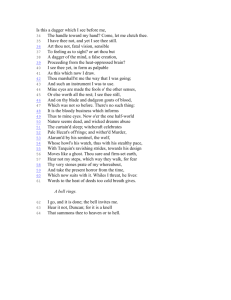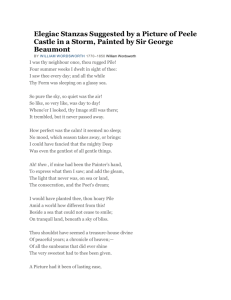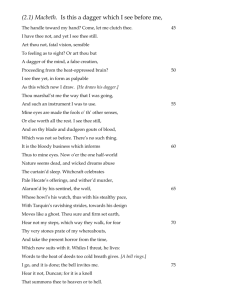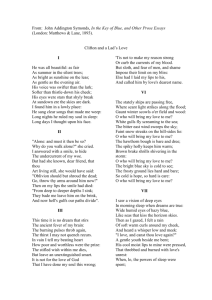ENG2305: The Victorian Period
advertisement
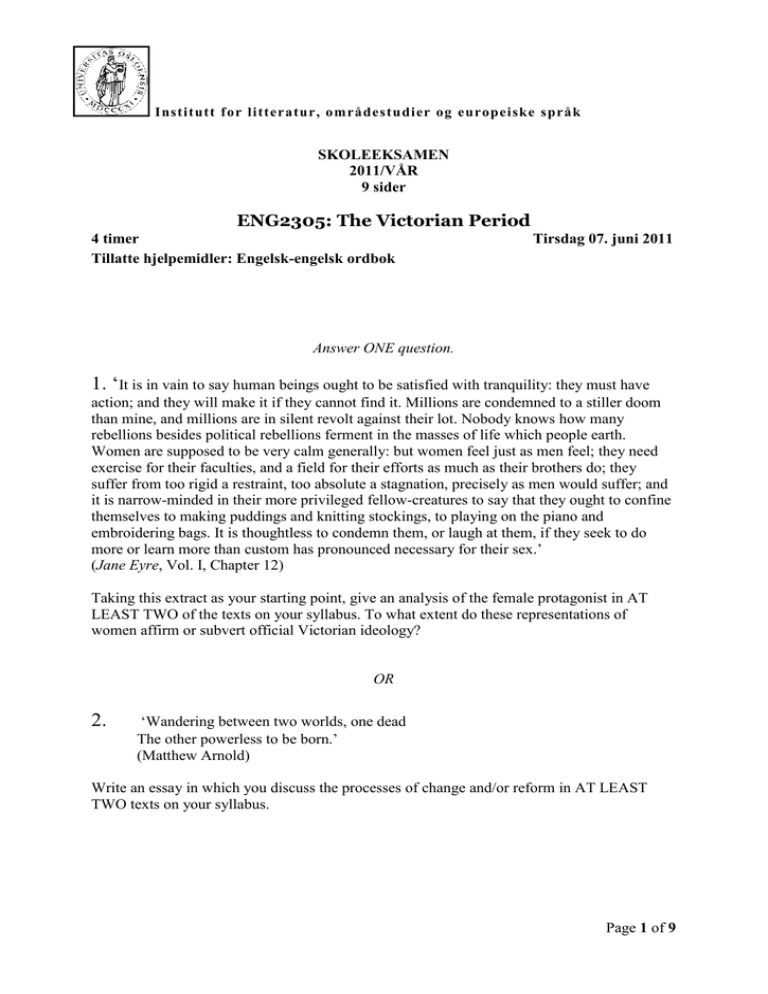
Institutt f or litteratur, områdestudier og europeiske språk SKOLEEKSAMEN 2011/VÅR 9 sider ENG2305: The Victorian Period 4 timer Tillatte hjelpemidler: Engelsk-engelsk ordbok Tirsdag 07. juni 2011 Answer ONE question. 1. ‘It is in vain to say human beings ought to be satisfied with tranquility: they must have action; and they will make it if they cannot find it. Millions are condemned to a stiller doom than mine, and millions are in silent revolt against their lot. Nobody knows how many rebellions besides political rebellions ferment in the masses of life which people earth. Women are supposed to be very calm generally: but women feel just as men feel; they need exercise for their faculties, and a field for their efforts as much as their brothers do; they suffer from too rigid a restraint, too absolute a stagnation, precisely as men would suffer; and it is narrow-minded in their more privileged fellow-creatures to say that they ought to confine themselves to making puddings and knitting stockings, to playing on the piano and embroidering bags. It is thoughtless to condemn them, or laugh at them, if they seek to do more or learn more than custom has pronounced necessary for their sex.’ (Jane Eyre, Vol. I, Chapter 12) Taking this extract as your starting point, give an analysis of the female protagonist in AT LEAST TWO of the texts on your syllabus. To what extent do these representations of women affirm or subvert official Victorian ideology? OR 2. ‘Wandering between two worlds, one dead The other powerless to be born.’ (Matthew Arnold) Write an essay in which you discuss the processes of change and/or reform in AT LEAST TWO texts on your syllabus. Page 1 of 9 OR 3. ‘Conrad saw and condemned the evil of imperial exploitation but was strangely unaware of the racism on which it sharpened its iron tooth.’ (Chinua Achebe) Give a reading of Joseph Conrad’s Heart of Darkness in which you discuss this claim. You may, if you like, also refer to other relevant texts on your syllabus. OR 4. Analyse Elizabeth Barrett Browning’s ‘Bertha in the Lane’, paying particular attention to the nature and function of the dramatic monologue. Poem provided (pp. 3-9) Page 2 of 9 Elizabeth Barrett Browning, ‘Bertha in the Lane’ (1844) 1 Put the broidery-frame away, For my sewing is all done: The last thread is used to-day, And I need not join it on. Though the clock stands at the noon I am weary. I have sewn, Sweet, for thee, a wedding-gown. 5 2 Sister, help me to the bed, And stand near me, Dearest-sweet. Do not shrink nor be afraid, Blushing with a sudden heat! No one standeth in the street?-By God’s love I go to meet, Love I thee with love complete. 10 3 Lean thy face down; drop it in These two hands, that I may hold ’Twixt their palms thy cheek and chin, Stroking back the curls of gold: ’Tis a fair, fair face, in sooth-Larger eyes and redder mouth Than mine were in my first youth. 15 20 4 Thou art younger by seven years-Ah!--so bashful at my gaze, That the lashes, hung with tears, Grow too heavy to upraise? I would wound thee by no touch Which thy shyness feels as such. Dost thou mind me, Dear, so much? 25 5 Have I not been nigh a mother To thy sweetness--tell me, Dear? Have we not loved one another Tenderly, from year to year, Since our dying mother mild 30 Page 3 of 9 Said with accents undefiled, ‘Child, be mother to this child’! 35 6 Mother, mother, up in heaven, Stand up on the jasper sea, And be witness I have given All the gifts required of me,-Hope that blessed me, bliss that crowned, Love that left me with a wound, Life itself that turneth round! 40 7 Mother, mother, thou art kind, Thou art standing in the room, In a molten glory shrined That rays off into the gloom! But thy smile is bright and bleak Like cold waves--I cannot speak, I sob in it, and grow weak. 45 8 Ghostly mother, keep aloof One hour longer from my soul, For I still am thinking of Earth’s warm-beating joy and dole! On my finger is a ring Which I still see glittering When the night hides everything. 50 55 9 Little sister, thou art pale! Ah, I have a wandering brain-But I lose that fever-bale, And my thoughts grow calm again. Lean down closer--closer still! I have words thine ear to fill, And would kiss thee at my will. 60 10 Dear, I heard thee in the spring, Thee and Robert--through the trees,-When we all went gathering Boughs of May-bloom for the bees. Do not start so! think instead 65 Page 4 of 9 How the sunshine overhead Seemed to trickle through the shade. 70 11 What a day it was, that day! Hills and vales did openly Seem to heave and throb away At the sight of the great sky: And the silence, as it stood In the glory's golden flood, Audibly did bud, and bud. 75 12 Through the winding hedgerows green, How we wandered, I and you, With the bowery tops shut in, And the gates that showed the view! How we talked there; thrushes soft Sang our praises out, or oft Bleatings took them from the croft: 80 13 Till the pleasure grown too strong Left me muter evermore, And, the winding road being long, I walked out of sight, before, And so, wrapt in musings fond, Issued (past the wayside pond) On the meadow-lands beyond. 85 90 14 I sate down beneath the beech Which leans over to the lane, And the far sound of your speech Did not promise any pain; And I blessed you full and free, With a smile stooped tenderly O'er the May-flowers on my knee. 95 15 But the sound grew into word As the speakers drew more near-Sweet, forgive me that I heard What you wished me not to hear. Do not weep so, do not shake, 100 Page 5 of 9 Oh,--I heard thee, Bertha, make Good true answers for my sake. 105 16 Yes, and he too! let him stand In thy thoughts, untouched by blame. Could he help it, if my hand He had claimed with hasty claim? That was wrong perhaps--but then Such things be--and will, again. Women cannot judge for men. 110 17 Had he seen thee when he swore He would love but me alone? Thou wast absent, sent before To our kin in Sidmouth town. When he saw thee who art best Past compare, and loveliest. He but judged thee as the rest. 115 18 Could we blame him with grave words, Thou and I, Dear, if we might? Thy brown eyes have looks like birds Flying straightway to the light: Mine are older.--Hush!--look out-Up the street! Is none without? How the poplar swings about! 120 125 19 And that hour--beneath the beech, When I listened in a dream, And he said in his deep speech That he owed me all esteem,-Each word swam in on my brain With a dim, dilating pain, Till it burst with that last strain. 130 20 I fell flooded with a dark, In the silence of a swoon. When I rose, still cold and stark, There was night; I saw the moon And the stars, each in its place, 135 Page 6 of 9 And the May-blooms on the grass, Seemed to wonder what I was. 140 21 And I walked as if apart From myself, when I could stand, And I pitied my own heart, As if I held it in my hand-Somewhat coldly, with a sense Of fulfilled benevolence, And a ‘Poor thing’ negligence. 145 22 And I answered coldly too, When you met me at the door; And I only heard the dew Dripping from me to the floor: And the flowers, I bade you see, Were too withered for the bee,-As my life, henceforth, for me. 150 23 Do not weep so--Dear,--heart-warm! All was best as it befell. If I say he did me harm, I speak wild,--I am not well. All his words were kind and good-He esteemed me. Only, blood Runs so faint in womanhood! 155 160 24 Then I always was too grave,-Liked the saddest ballad sung,-With that look, besides, we have In our faces, who die young. I had died, Dear, all the same; Life’s long, joyous, jostling game Is too loud for my meek shame. 165 25 We are so unlike each other, Thou and I, that none could guess We were children of one mother, But for mutual tenderness. Thou art rose-lined from the cold, 170 Page 7 of 9 And meant verily to hold Life’s pure pleasures manifold. 175 26 I am pale as crocus grows Close beside a rose-tree’s root; Whosoe'er would reach the rose, Treads the crocus underfoot. I, like May-bloom on thorn-tree, Thou, like merry summer-bee,-Fit that I be plucked for thee! 180 27 Yet who plucks me?--no one mourns, I have lived my season out, And now die of my own thorns Which I could not live without. Sweet, be merry! How the light Comes and goes! If it be night, Keep the candles in my sight. 185 28 Are there footsteps at the door? Look out quickly. Yea, or nay? Some one might be waiting for Some last word that I might say. Nay? So best!--so angels would Stand off clear from deathly road, Not to cross the sight of God. 190 195 29 Colder grow my hands and feet. When I wear the shroud I made, Let the folds lie straight and neat, And the rosemary be spread, That if any friend should come, (To see thee, Sweet!) all the room May be lifted out of gloom. 200 30 And, dear Bertha, let me keep On my hand this little ring, Which at nights, when others sleep, I can still see glittering! Let me wear it out of sight, 205 Page 8 of 9 In the grave,--where it will light All the dark up, day and night. 210 31 On that grave drop not a tear! Else, though fathom-deep the place, Through the woollen shroud I wear I shall feel it on my face. Rather smile there, blessèd one, Thinking of me in the sun, Or forget me--smiling on! 215 32 Art thou near me? nearer! so-Kiss me close upon the eyes, That the earthly light may go Sweetly, as it used to rise When I watched the morning-grey Strike, betwixt the hills, the way He was sure to come that day. 220 33 So,--no more vain words be said! The hosannas nearer roll. Mother, smile now on thy Dead, I am death-strong in my soul. Mystic Dove alit on cross, Guide the poor bird of the snows Through the snow-wind above loss! 225 230 34 Jesus, Victim, comprehending Love’s divine self-abnegation, Cleanse my love in its self-spending, And absorb the poor libation! Wind my thread of life up higher, Up, through angels’ hands of fire! I aspire while I expire. 235 Begrunnelse: Ta kontakt med din faglærer på e-post innen 1 uke etter at sensuren er kunngjort i StudentWeb. Oppgi navn og kandidatnummer. Sensor bestemmer om begrunnelsen skal gis skriftlig eller muntlig. Page 9 of 9


